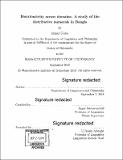| dc.contributor.advisor | Roger Schwarzschild. | en_US |
| dc.contributor.author | Guha, Ishani | en_US |
| dc.contributor.other | Massachusetts Institute of Technology. Department of Linguistics and Philosophy. | en_US |
| dc.coverage.spatial | a-bg--- | en_US |
| dc.date.accessioned | 2019-03-01T19:57:30Z | |
| dc.date.available | 2019-03-01T19:57:30Z | |
| dc.date.copyright | 2018 | en_US |
| dc.date.issued | 2018 | en_US |
| dc.identifier.uri | http://hdl.handle.net/1721.1/120678 | |
| dc.description | Thesis: Ph. D. in Linguistics, Massachusetts Institute of Technology, Department of Linguistics and Philosophy, 2018. | en_US |
| dc.description | Cataloged from PDF version of thesis. | en_US |
| dc.description | Includes bibliographical references (pages 177-180). | en_US |
| dc.description.abstract | In this thesis, studying the numeral indefinites in Bangla, I argue that distributive numerals are not distributivity operators themselves. The distributive numerals introduce a plurality of discourse referents, and they require that this plurality of discourse referents must enter into a formal relationship with the plurality of individuals introduced by another discourse referent. This formal requirement is known as dependency. Conventionally the phenomenon is called covariation. A distributivity operator is such that it allows this formal relationship to hold in its scope. I argue that examples involving ditransitives provide clear evidence for such an analysis. Apart from this, I discuss that the different forms of numerals have an additional restriction about encoding specificity effects. I show that the requirement of specificity and the requirement of covariation interact with each other in the scope of a distributivity operator. This interaction is encoded morphologically by differentiating between simple and complex forms of distributive numerals. The proposal is implemented by using Dynamic Plural Logic. Finally I show that the particular formalization can be extended to account for the difference between adnominal distributive numerals and adverbial (which I call 'pluractional') distributive numerals. To analyze the adnominal and adverbial distributive numerals I propose to differentiate between distributivity in the domain of individuals and distributivity in the domain of events. | en_US |
| dc.description.statementofresponsibility | by Ishani Guha. | en_US |
| dc.format.extent | 180 pages | en_US |
| dc.language.iso | eng | en_US |
| dc.publisher | Massachusetts Institute of Technology | en_US |
| dc.rights | MIT theses are protected by copyright. They may be viewed, downloaded, or printed from this source but further reproduction or distribution in any format is prohibited without written permission. | en_US |
| dc.rights.uri | http://dspace.mit.edu/handle/1721.1/7582 | en_US |
| dc.subject | Linguistics and Philosophy. | en_US |
| dc.title | Distributivity across domains : a study of the distributive numerals in Bangla | en_US |
| dc.title.alternative | Study of the distributive numerals in Bangla | en_US |
| dc.type | Thesis | en_US |
| dc.description.degree | Ph. D. in Linguistics | en_US |
| dc.contributor.department | Massachusetts Institute of Technology. Department of Linguistics and Philosophy | |
| dc.identifier.oclc | 1088556377 | en_US |
